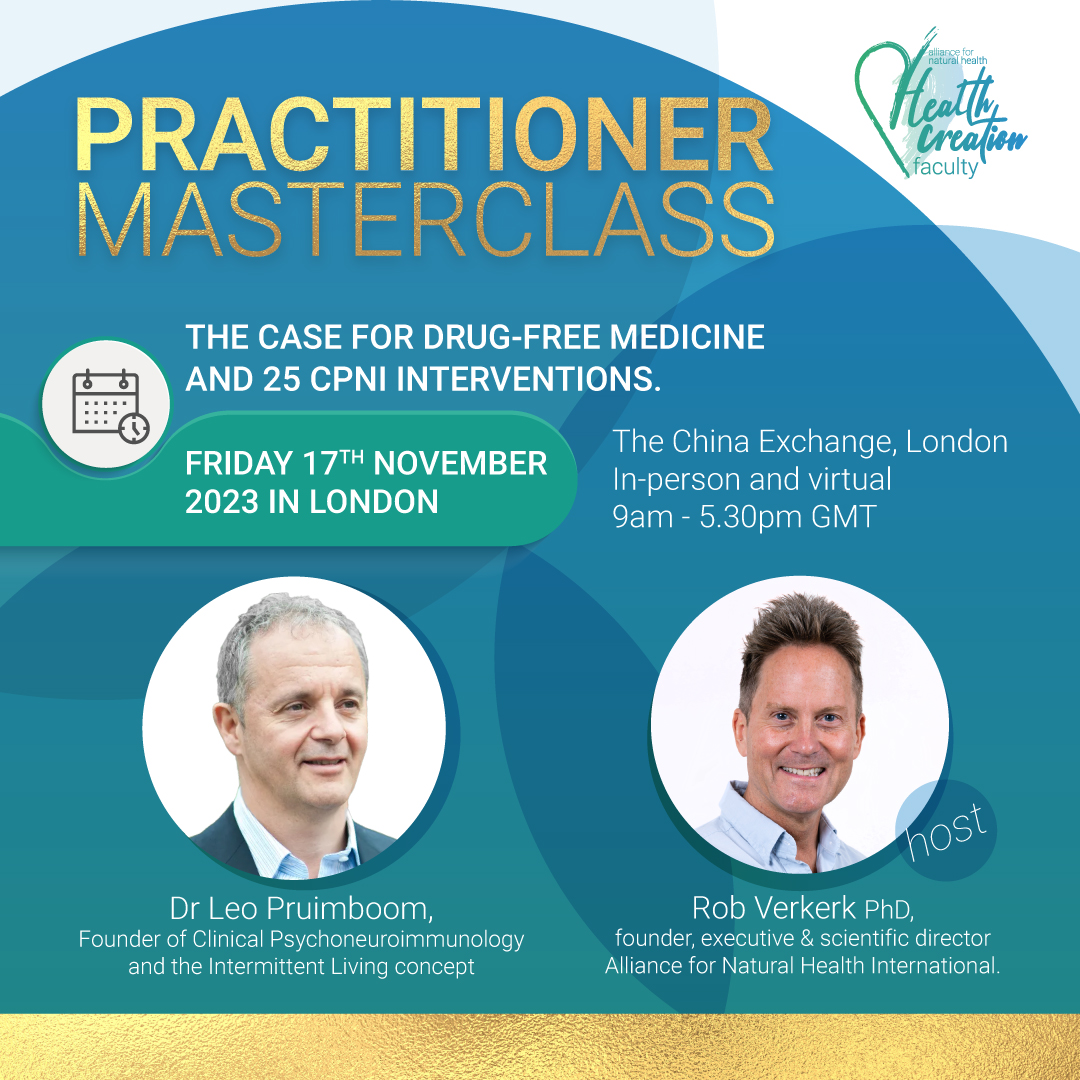Content Sections
Masterclass recordings
'The case for drug-free medicine and 25 CPNI interventions'
Stress is only stress when it irritates long enough to produce a molecular pattern that activates the immune system. In this way it becomes logical that toxic emotions or toxic thoughts can make you ill. The conventional view of health and disease has forgotten that a disease is the consequence of a universal phenomenon called 'Life'. So to unravel the film of every malady, it is necessary to identify the stressors and pathways by which ‘irritation’ causes inflammation. From here, we can learn how to change 'Life', along with our responses and behaviours, to reduce or eliminate inflammation and become robust, as nature intended.
What is CPNI?
Clinical psychoneuroimmunology (CPNI) is an exciting, rapidly evolving and translational field of medicine that explores the connections between the supersystem comprised of the mind, nervous, endocrine and immune systems. In the process, CPNI identifies clinical interventions that optimise multi-system function while positively influencing multiple risk factors known to activate disease mechanisms. It looks at how thoughts, feelings, and behaviours interact with our ancestry and epigenetic expression to create unique and individual traits that influence physical and psychological health — particularly immune function, which exerts influence on every cell in the body. It could more accurately be termed clinical psycho-neuro-socio-endo-metabolo-immunology.
CPNI is an ever-growing interdisciplinary science that is deepening our knowledge of how this communication network operates. Understanding the body's adaptive processes can help us identify relevant pathways for intervention to bring about positive change to health and wellbeing. CPNI is firmly rooted in evolutionary biology appreciating our genetic makeup and the environmental influences that shape the epigenetic expression of our genes.
Why should buy the Masterclass recordings?
This Masterclass will deepen your knowledge and top up your toolkit with 25 effective interventions, peppered throughout the presentations, that you can put into practice on your next day in clinic. You’ll get to see health and disease through a new lens and learn how stress can produce molecular patterns that activate the immune system in a way that creates illness; how the body creates a ‘film’ of dysfunction and disease, and where to intervene to unravel it; the mechanism for why toxic thinking creates illness; how to address multiple risk factors that activate disease mechanisms and so much more. It’s medicine but not as you may have known it!
So, whether you’re a health professional, a health coach, student of either, or just someone interested in learning more about your health, this Masterclass is for you! Join us to dive deep into the fascinating discipline of CPNI, delivered by its founder, physiologist and medical biochemist, Dr Leo Pruimboom. Over 30 years since its inception, CPNI has really come of age: hard science, anchored by a core of epistemology, delivered with softer skills. You really can’t afford to miss it.
Click here to purchase the professional recordings
About the speakers
Dr Leo Pruimboom has been transforming lives for decades having pioneered the clinical application of psychoneuroimmunology (PNI), the science of the supersystem that represents the master controller of physiological, metabolic, immunological, endocrinological, neurological, psychological and behavioural processes. Processes that make us who we are, respond to our environments as we do, and largely influence the health status we experience at any given point in time. As the founder of clinical psychoneuroimmunology — CPNI for short, or KPNI if you're in Europe — Dr Pruimboom has gone on to develop the transformational Intermittent Living concept.
Dr Pruimboom describes CPNI as an advanced and complete system of medicine that provides an integrative overview of an individual’s health. It examines interconnected body systems and their relationship with psychological, social and ecological aspects of a patient or client’s life. The canvas of CPNI is thus actually broader than the original concept of PNI as proposed by Robert Ader and Nicholas Cohen back in 1975, and can be thought of as the application of 'clinical psycho-neuro-socio-endo-metabolo-immunology' as a means of identifying the multiple risk factors which activate disease mechanisms as well as those that regenerate health. CPNI is, in effect, a hard science with a strong evidence base — one that transgresses the limits of established dogma — delivered with softer skills.
In celebrating CPNI’s 35 years as a translational medical discipline, Dr Pruimboom offers this rare opportunity to sunderstand how one moves from exploring how CPNI and the Intermittent Living concept can be implemented by health practitioners and coaches from diverse backgrounds for the purpose of transforming lives and outcomes.
The event was hosted by Dr Rob Verkerk, the founder, executive and scientific director of the Alliance for Natural Health. Dr Verkerk is a multi-disciplinary scientist who has spent four decades exploring human interactions with our internal and external environments. Dr Pruimboom’s masterclass is punctuated with two presentations by Dr Verkerk. In the first, he shares new ways of looking at life, human beings, and our relationships with our internal and external worlds, while, in the second, he shares insights on the role of environmental programming of our minds and bodies — as well as ways of undoing negative programs.
Purchase Masterclass recordings
Browse all the courses on offer - ANH Health Creation Faculty Curriculum




